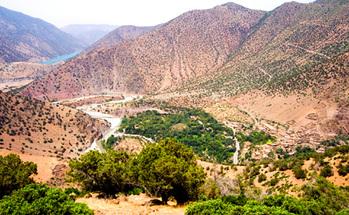Context
The Kingdom of Morocco is home to a great diversity of ecosystems, species and genetic resources – an important basis for the livelihoods of rural communities and the country’s economic development. The economic potential of ecosystem services such as natural products, genetic resources, water purification and regulation or recovery are currently being inadequately or unsustainably used. Many ecosystem services are being over-utilised or degraded, and their potential for use is increasingly threatened by the impacts of climate change.
The government of Morocco is making extensive political and strategic efforts to conserve biodiversity, taking into account climate risks in the development of affected sectors including agriculture, nature conservation and tourism. However, the responsible state institutions have thus far lacked appropriate instruments for promoting the sustainable use of ecosystem services while considering climate risks.
Objective
Morocco’s state institutions have introduced methods and instruments for sustainable and efficient use of ecosystem services while taking climate risks into account.
Approach
The specialist, organisational and policy advising by the partner organisations as well as the programme’s capacity development measures are focused on three areas of action:
- Safeguarding and sustainable use of ecosystem services with consideration for climate risks
- Expansion of regional information monitoring and advisory system for climate change adaptation and biodiversity management
- Development of the legal and institutional framework for the access and benefit sharing mechanism (ABS, Nagoya Protocol), and consideration of ecosystem services and climate change adaptation in national strategies and programmes
Across all three areas of action, the programme is placing a particular focus on promoting cross-sector coordination and cooperation. It is concentrating its efforts on the southern region of Souss-Massa-Drâa (Agadir, Ouarzazate) as well as Tadla Azilal in the Middle Atlas (Beni Melall). The programme is working in a complementary manner to other German and multilateral development cooperation activities.
The programme is supporting the Moroccan government in the implementation of the Nagoya Protocol, which is an international environmental agreement that was concluded within the context of the UN Convention on Biological Diversity and has been ratified by Morocco among others. Access and benefit sharing (ABS) was decided upon within the Nagoya Protocol – access to genetic resources and the fair equitable sharing of their benefits – a mechanism introduced by the UN Convention on Biological Diversity. ABS is aimed at addressing international biopiracy. It provides international regulations on access to genetic resources in order to ensure fair sharing of benefits arising from the use of these resources for the local communities (Fair Trade).
The consulting firm GOPA supports the implementation of the project.
Results
As part of the project, a capacity development programme was developed on incorporating ecosystem services and climate change adaptation into regional and municipal development plans and is currently being implemented. Those involved in the Regional Observatories for Environment and Sustainable Development (OREDD) from the regional authorities and municipalities in the pilot regions are receiving support to strengthen their roles and responsibilities related to climate change adaptation.
Sustainability standards were developed for local ecotourism in the Souss-Massa pilot region, particularly for protected areas as well as the argan forest and its products. The basic groundwork for certification was created among Moroccan ecotourism providers.
The programme is helping to improve regional environmental governance. A monitoring system for climate change adaptation was established for the OREDD in the pilot regions. In cooperation with the stakeholders and all regional actors, indicators on climate change adaptation and biodiversity management were developed and agreed upon. Obligations were laid down regarding roles and responsibilities for the collection and provisioning of climate and biodiversity data.
The National Observatory for the Environment and Sustainable Development (Observatoire National de l’Environnement et du Développement Durable, ONEM) has decided to broadly apply this innovation across all of Morocco’s 16 regions (wilayas), to integrate all the collected data into the regional environmental information system (SIRE), and to incorporate this into municipal planning processes.
Along with its Moroccan partners from the academic and private sectors, the programme has begun developing the legal and institutional framework for access and benefit sharing (ABS). An initial draft of the legislation for implementing the Nagoya Protocol in Morocco has been drafted and made available for the first reading. In addition, a development partnership was agreed upon with a European cosmetic company on the use of Morocco’s biological resources and their exploitation for cosmetics in accordance with the ABS certification mechanism.

